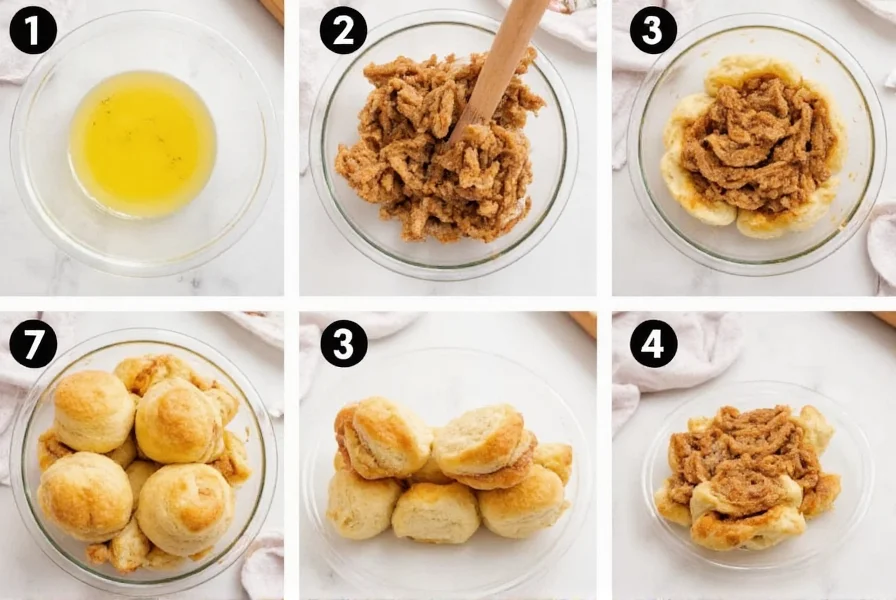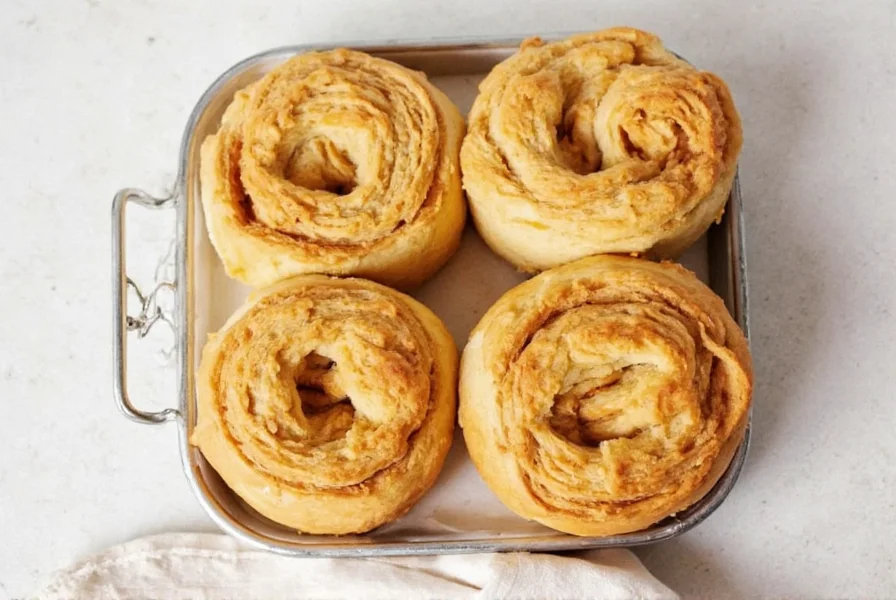Transforming canned biscuits into bakery-quality cinnamon rolls is one of the simplest kitchen hacks that delivers impressive results with minimal effort. This approach combines the convenience of store-bought biscuit dough with the irresistible flavor of traditional cinnamon rolls, making it perfect for busy mornings, unexpected guests, or when you're craving something sweet but don't want to spend hours baking from scratch.
Why Canned Biscuits Make Perfect Cinnamon Rolls
Canned biscuit cinnamon rolls have become increasingly popular because they solve the biggest barrier to making this breakfast favorite: time. While traditional cinnamon roll recipes require yeast proofing, multiple risings, and careful handling, the canned biscuit method cuts preparation time dramatically while still delivering that signature swirl of cinnamon-sugar filling and gooey center.
The secret lies in the biscuit dough's texture and consistency. Most refrigerated biscuit doughs contain just the right amount of fat and leavening to create a tender, slightly flaky roll that holds its shape during baking while developing that desirable pull-apart quality when done properly.
Basic Canned Biscuit Cinnamon Rolls Recipe
This streamlined recipe transforms a standard 12-ounce tube of refrigerated biscuits into eight generous cinnamon rolls with minimal ingredients you likely already have in your pantry.
| Ingredient | Amount | Notes |
|---|---|---|
| Refrigerated biscuit dough | 1 tube (12.4-16 oz) | 8-10 biscuits per tube |
| Unsalted butter | ⅓ cup (75g), melted | Use real butter for best flavor |
| Brown sugar | ½ cup (100g) | Packed firmly |
| Granulated sugar | 2 tablespoons | For extra sweetness |
| Cinnamon | 1½ tablespoons | Freshly ground preferred |
| Vanilla extract | 1 teaspoon | For flavor enhancement |
Step-by-Step Instructions
- Preheat your oven to 350°F (175°C) and prepare an 8x8 or 9x9 inch baking pan with parchment paper or non-stick spray
- Separate biscuits and flatten each into a 4-5 inch circle using a rolling pin or clean hands
- Mix brown sugar, granulated sugar, and cinnamon in a small bowl
- Brush melted butter over each flattened biscuit, leaving a small border around the edges
- Sprinkle sugar mixture evenly over the buttered surface
- Tightly roll each biscuit from one edge to the other
- Place rolls seam-side down in prepared pan with about ½ inch between them
- Bake for 18-22 minutes until golden brown and fully cooked through
- While baking, prepare glaze by mixing powdered sugar, milk, and vanilla extract
- Drizzle warm glaze over cooled rolls

Proven Variations for Canned Biscuit Cinnamon Rolls
Once you've mastered the basic technique, these tested variations can elevate your canned biscuit cinnamon rolls from simple to spectacular:
- Cheesecake swirl rolls: Mix 4 oz softened cream cheese with 2 tablespoons sugar and ½ teaspoon vanilla. Spread this mixture before adding the cinnamon sugar.
- Apple cinnamon rolls: Add ¼ cup finely diced apple (like Honeycrisp) to the cinnamon sugar mixture for a fruit-filled twist.
- Chocolate drizzle rolls: After baking, drizzle with melted chocolate instead of traditional icing.
- Overnight cinnamon rolls: Prepare rolls as directed but refrigerate assembled pan overnight. Bake straight from the fridge, adding 5-7 minutes to baking time.
Troubleshooting Common Canned Biscuit Cinnamon Roll Issues
Even with this simplified method, you might encounter some challenges. Here's how to solve the most frequent problems when making canned biscuit cinnamon rolls:
Why Your Rolls Might Be Too Dense
If your rolls come out dense rather than light and fluffy, you've likely overworked the dough during rolling. Canned biscuits contain just enough gluten development for biscuits, but excessive handling makes them tough. Handle the flattened biscuits gently and avoid pressing down too hard when rolling.
Preventing Burnt Bottoms
The high sugar content in the filling can cause bottoms to burn before the rolls are fully cooked. To prevent this issue when making canned biscuit cinnamon rolls, use a light-colored metal pan (not dark non-stick), place the pan on a lower oven rack, or line the bottom of your pan with a thin layer of melted butter before adding the rolls.
Ensuring Proper Rising
Unlike yeast rolls, canned biscuits don't require rising time, but they do need proper spacing in the pan. Place rolls at least ½ inch apart to allow for expansion during baking. If your rolls aren't pulling apart nicely, you might have cut the biscuits too thick or used a pan that's too small.

Storage and Reheating Tips for Best Results
One advantage of canned biscuit cinnamon rolls is their excellent shelf life and reheating properties. Store cooled rolls in an airtight container at room temperature for up to 2 days or refrigerate for up to 5 days.
For the best reheating results when enjoying leftover canned biscuit cinnamon rolls, wrap individual rolls in a damp paper towel and microwave for 15-20 seconds. This method restores moisture without making the rolls soggy. Alternatively, place rolls on a baking sheet and warm in a 300°F oven for 8-10 minutes for more even heating.
Frequently Asked Questions
Can I use crescent roll dough instead of canned biscuits for cinnamon rolls?
Yes, crescent roll dough works well as an alternative to canned biscuits for cinnamon rolls. The thinner, flakier texture creates a different but equally delicious result with more defined layers. Use the same filling ratio but reduce baking time by 3-5 minutes since crescent dough is thinner.
How do I prevent canned biscuit cinnamon rolls from sticking to the pan?
To prevent sticking when making canned biscuit cinnamon rolls, generously grease your baking pan with butter or non-stick spray, or line it with parchment paper. For extra insurance, brush the bottom of the pan with melted butter before placing the rolls in the pan, as the sugar in the filling can become sticky during baking.
What's the best way to slice canned biscuits for perfect cinnamon rolls?
For uniform canned biscuit cinnamon rolls, use a sharp knife or dental floss to slice through the tube of biscuits. Dental floss works particularly well as it cuts cleanly without compressing the dough. Make sure to cut biscuits to equal thickness (about ¾ inch) for consistent baking results.
Can I make canned biscuit cinnamon rolls ahead of time for holidays?
Absolutely. Prepare your canned biscuit cinnamon rolls up to the baking stage, then cover tightly and refrigerate for up to 24 hours. When ready to bake, remove from refrigerator while oven preheats, then bake as directed, adding 5-7 minutes to the baking time since they'll be cold from the fridge.
Why do my canned biscuit cinnamon rolls sometimes fall apart when pulling them apart?
This usually happens when the rolls haven't cooled slightly before serving. Let canned biscuit cinnamon rolls rest for 5-7 minutes after baking so the filling can set slightly. If they still fall apart, you may have used too much butter in the filling layer, which prevents the sugar mixture from binding the layers together during baking.











 浙公网安备
33010002000092号
浙公网安备
33010002000092号 浙B2-20120091-4
浙B2-20120091-4